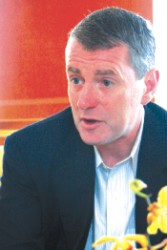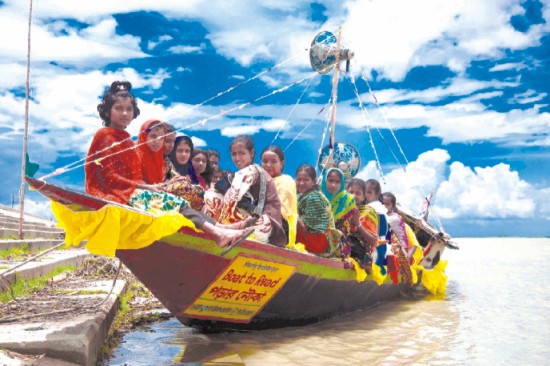|
Interview
For the Love of Reading
Almost as important as 'providing' children with education is getting them to want to be literate and to enjoy reading. JOHN WOOD, founder of international non-profit organisation Room to Read, has been doing just this for over a decade, giving up his corporate job to try to change the world through education. Recently in Bangladesh, Wood, author of Leaving Microsoft to Change the World and children's book Zak the Yak, spoke to The Star's KAJALIE SHEHREEN ISLAM about the value of education and the importance of a love for reading.
How did it all start?
 |
| Founder of ‘Room to Read’ John Wood |
When I used to work for Microsoft, I spent a lot of time in Asia. I noticed the culture of haves and have-nots, and, even more so, the disparity between the educated and the illiterate and I thought to myself, 'how do you tell a child that you can't send him/her to school?' Today, Asia has some of the most dynamic economies, and it has achieved this through education.
While trekking in the Himalayas in 1998, I came across a school in the village of Bahundanda in Nepal. It had 450 students, a library, but no books. The fact that they had a library meant that they understood its importance, but they did not have the resources to build one. I thought to myself, with that many students, the library should have at least 1,000 books. The following year, I went back to the school with 3,000 books. The excitement on the children's and their parents' faces was palpable, the hope that the children's lives would be better. But I knew what I had done was only a drop in the ocean, there was so much more to be done. That is how Room to Read started, in Nepal.
How did you choose the countries after that?
Next came Vietnam and then Cambodia, which I chose for two reasons. One was their enormous human potential. The other reason was a sense of what my country had done to those countries in the 1960s and 1970s and I wanted to do something to at least try and repair some of the damage. The people welcomed me, there was no animosity. Then we moved to India, which had the largest number of illiterate people in the world. If you're going to battle illiteracy, you have to address India.
How did you come to start work in Bangladesh?
In 2005, we had a study done to see which countries needed us the most. But we also wanted countries which were enthusiastic about and respected education, where the governments were trying to do a good job themselves - because we work with the government - and also where our donors were interested. We settled on Bangladesh, Laos and Sri Lanka, but after the tsunami, we went to Sri Lanka first, raising 2 million USD to rebuild schools there. We finally started operations in Bangladesh in 2008-in Sirajganj and Brahmanbaria.
What are the strengths and strategies - you claim to combine business - with philanthropy of your organisation?
I don't believe in outsiders coming and solving the problems of the local people. There is innate talent in every country and I believe in the strength and passion of local workers to make projects such as these successful. Our country director in every country is important, and it is crucial that they realise the importance of transparency.
Our organisation is also very performance-driven. I let my local team set goals and I help them to meet them and at the end of the year, I expect them to be met. We stress on the importance of scalable, measured, sustainable results - the number of students who have been promoted to the next grade, or the number of girls getting scholarships, etc.
What have you done so far in Bangladesh?
We've set up 175 libraries, we're giving scholarships to 230 female students. Our next project is to bring out five children's literature books in Bangla. Education has to be culturally relevant and it is important that literature is available in local languages. This is only our second year in Bangladesh and it is our smallest operation right now, but it will be expanded. I believe in creating a ‘litera-environment’. For this we select schools, we provide training to teachers, we want schools to be a living, breathing ecosystem. We want children to realise that reading is not a punishment and it is not a chore, reading is something you get to do. We have reading games, like 'run and read' and 'reading relay' in which children have to run and read excerpts from books and then run and answer comprehensive questions, or where one child reads an excerpt and relays it to others and they have to answer the questions. We want to encourage a reading habit, a culture of reading which children may not have picked up from their family members who are illiterate. When they see their teachers, school staff and others read, they will want to read too. In Bangladesh, in terms of the scholarship programme, we monitor the attendance of the female students, we also stress on life skills and health care such as hygiene, sexual health, etc.

‘Boat to Read’s pick-up and drop-off service to and from school during the wet season.
What are the biggest challenges?
The biggest challenge is that there is so much that needs to be done. I feel as if I could be doing so much more. In Bangladesh itself, there are some 84,000 primary schools, most of them lack libraries. But I tell myself to be patient.
How has this work affected your own life?
My life is chaos - long hours, a lot of travel, less money, but I'm happy. When I see girls in Bangladesh going to school during the wet season which they couldn't before but can now because of Boat to Read, I feel happy. I grew up in a poor family, my father was the only one of his siblings to go to university because he got a scholarship. I went to a public school, had access to a public library, I had all these things because I was lucky. I was always read to as a child, by my older sister, my mother and my grandmother - this may also be the reason that, while our organisation doesn't focus on any particular groups, we take care to see that women aren't left behind. I was lucky to be brought up in a family that valued education and reading.
What do you yourself like to read?
I read everything - newspapers, magazines, history, current events, biographies, good fiction. For me, 'heaven would look like a library'.
What are some of the stories that have touched you, about the lives of those you have touched?
There are so many stories. After we opened the library in Vietnam, a boy there greeted me and told me that his goal was to read every book in the library. And I asked him, are you sure you can do that? There are over 1,000 books in the library. And he told me, 'I can do it. I climbed in through the window last night with a flashlight and I read nine books.' Then there is a girl in Nepal who is about as old as the first library there. She's convinced that she will be a doctor because she has read a lot and is good at math and science. When I ask her if she's read anything else, she says she likes to read storybooks too. She's on the path to medical school and I've told her that if she goes to medical school - and she'll be the first person from her village to do so - we'll manage the funding. These are only some of the stories that leave you feeling happy and inspired to do more.
Where do you want to go from here?
I have always wanted to grow in the number of schools I contribute to. Someday I want there to be 100,000 village libraries. I don't want to be a leader of an organisation but one of the leaders of a movement, a movement on the issue of literacy. Illiteracy affects millions, more people than HIV/AIDS, malaria and cholera combined. If you make today's kids literate, it's not only them but the generations after them whose lives change.
Copyright
(R) thedailystar.net 2010 |
| |
